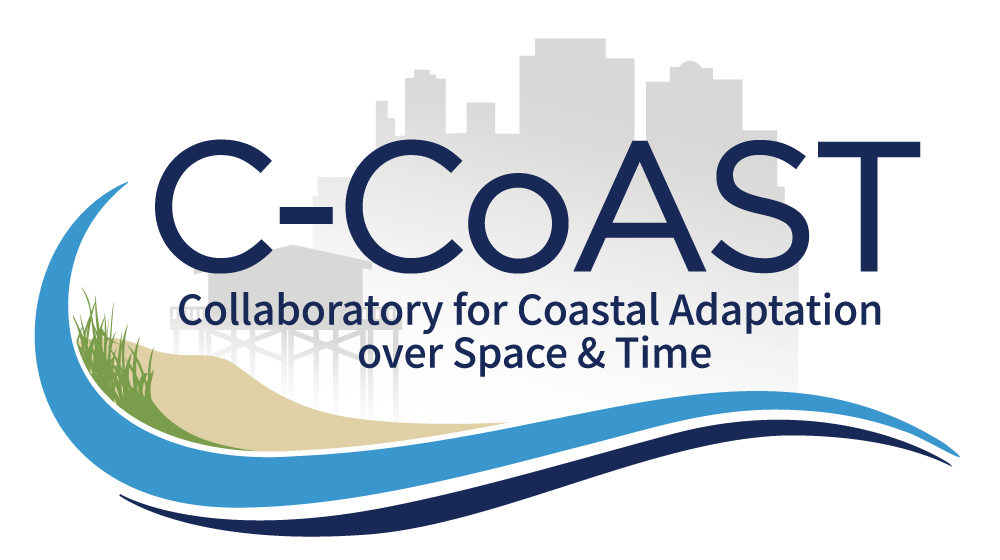Disciplines 101 Seminar #1
“Positive and Normative Theory in the Social Sciences”
Megan Mullin (Duke University) and Martin D. Smith (Duke University)
“Nonlinear Systems and Coupled Modeling”
Dylan McNamara (UNC – Wilmington) and Brad Murray (Duke University)
The purpose of this first session was to provide scientific scaffolding to facilitate interdisciplinary and transdisciplinary collaboration throughout the project. Mullin and Smith made connections between two different activities in social science and policy and illustrated these connections with examples from coastal policy. McNamara and Murray introduced the language, theories, and methods of nonlinear dynamics that are central to the core questions C-CoAST seeks to investigate and provided examples from coastal systems.
Suggested Reading
General:
- Werner, Bradley T., and Dylan E. McNamara. “Dynamics of coupled human-landscape systems.” Geomorphology 91.3-4 (2007): 393-407.
- French, J., Payo, A., Murray, A. B., Orford, J., Eliot, M., and Cowell, P., 2016, Appropriate complexity for the prediction of coastal and estuarine geomorphic behavior at decadal to centennial scales, Geomorphology, 256, 3 – 16, http://dx.doi.org/10.1016/j.geomorph.2015.10.005.
- Murray, A.B., Lazarus, E., Ashton, A., Baas, A., Coco, G., Coulthard, T., Fonstad, M., Haff, P.K., McNamara, D., Paola, C., Reinhardt, L., 2008, Geomorphology, complexity, and the emerging science of the Earth’s surface, Gemorphology, 103, 496-505.
- Pelletier, J. D., Brad Murray, A., Pierce, J. L., Bierman, P. R., Breshears, D. D., Crosby, B. T., Ellis, M., Foufoula-Georgiou, E., Heimsath, A. M., Houser, C., Lancaster, N., Marani, M., Merritts, D. J., Moore, L. J., Pederson, J. L., Poulos, M. J., Rittenour, T. M., Rowland, J. C., Ruggiero, P., Ward, D. J., Wickert, A. D. and Yager, E. M., 2015, Forecasting the response of Earth’s surface to future climatic and land use changes: A review of methods and research needs. Earth’s Future, 3: 220–251. doi:10.1002/2014EF000290.
Nonlinear Dynamics:
- McNamara, Dylan E., A. Brad Murray, and Martin D. Smith. “Coastal sustainability depends on how economic and coastline responses to climate change affect each other.” Geophysical Research Letters 38.7 (2011).
- McNamara, Dylan E., and Andrew Keeler. “A coupled physical and economic model of the response of coastal real estate to climate risk.” Nature Climate Change 3.6 (2013): 559-562.
- Williams, Z. C., McNamara, D. E., Smith, M. D., Murray, A. B., and Gopalakrishnan, S., 2013, Coupled Economic-Coastline Modeling with Suckers and Free Riders, J. Geophysical Research, 118, 887-899, DOI: 10.1002/jgrf.20066.
Positive economic modeling of beach nourishment:
- Smith, M.D., Slott, J.M., McNamara, D. and Murray, A.B., 2009. Beach nourishment as a dynamic capital accumulation problem. Journal of Environmental Economics and Management, 58(1), pp.58-71.
Positive economic modeling of beach nourishment with normative implications:
- Gopalakrishnan, S., McNamara, D., Smith, M.D. and Murray, A.B., 2017. Decentralized management hinders coastal climate adaptation: the spatial-dynamics of beach nourishment. Environmental and Resource Economics, 67(4), pp.761-787.
Positive political science modeling of beach nourishment:
- Mullin, M., Smith, M.D. and McNamara, D.E., 2019. Paying to save the beach: effects of local finance decisions on coastal management. Climatic Change, 152(2), pp.275-289.
On positive/normative distinctions in economics and political science:
- Colander, D. and Su, H.C., 2015. Making sense of economists’ positive-normative distinction. Journal of Economic Methodology, 22(2), pp.157-170.
- Gerring, J. and Yesnowitz, J. 2006. A normative turn in political science? Polity, 38, pp.101-133.



